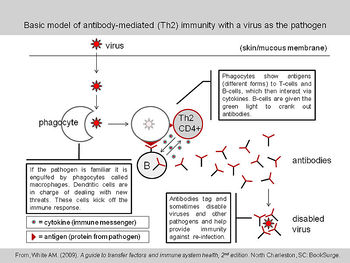Adaptive Immunity to Viruses
Humoral
The humoral response to viruses involves the production of neutralising antibody and Antibody-dependent cell mediated cytotoxicity (ADCC). Antibody-labelled cells can be targeted by NK Cells as another defence against viral infection. The antibody produced against viral protein can attach to infected cells during their budding phase, which effectively labels them for NK targeting. NK cells express Fcγ receptors with which to detect such cells. Once activated, they release a host of enzymes to induce apoptosis of the budding cell.
Cell-Mediated
The cell-mediated response to viruses involves CD8+ T-cell mediated killing of virus infected cells. They are the main cells involved in the immune response to intracellular virus infection. Viruses are detected by the recognition of MHC I-peptide complex and infected cells are killed by apoptosis. Perforin and granzymes activate the caspase cascade and Fas-ligand triggers the Fas-mediated apoptosis pathway. Cytotoxic cytokines (especially TNF-α & TNF-β lymphotoxin) act on TNF receptors to induce programmed cell death.
| Originally funded by the RVC Jim Bee Award 2007 |
Error in widget FBRecommend: unable to write file /var/www/wikivet.net/extensions/Widgets/compiled_templates/wrt699fd6052b9441_56225984 Error in widget google+: unable to write file /var/www/wikivet.net/extensions/Widgets/compiled_templates/wrt699fd6053148a8_31443331 Error in widget TwitterTweet: unable to write file /var/www/wikivet.net/extensions/Widgets/compiled_templates/wrt699fd605361002_06503747
|
| WikiVet® Introduction - Help WikiVet - Report a Problem |
